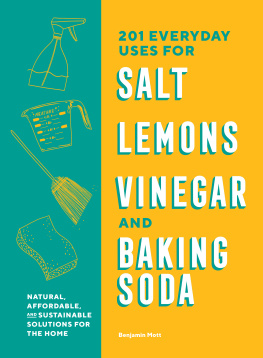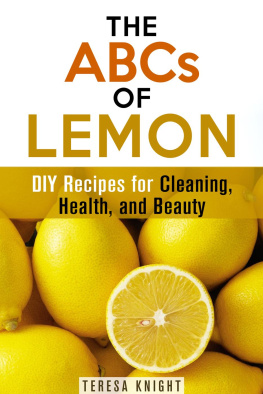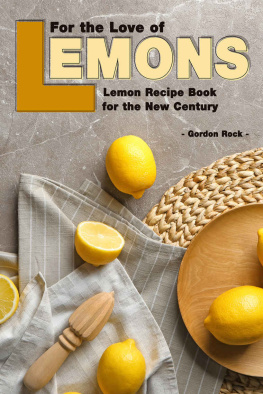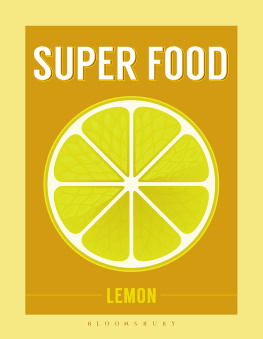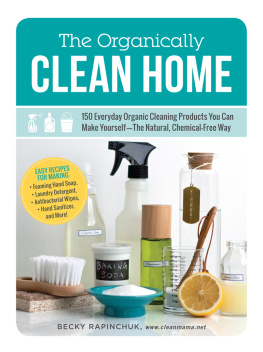All about Lemons
Over 60 DIY Lemon Recipes for Health and Household
Copyright Notice
Reproduction, duplication, transmission of this document in part or in whole is permitted only with written permission from the publisher. All rights reserved.
Respective brands and trademarks mentioned in this book belong to their respective owners.
Disclaimer
This document is geared towards providing summarization of information related to the topic. While all attempts have been made to verify the accuracy of the information, the author does not assume any responsibility for errors, omissions, or interpretations of the content. The information is offered for informational or entertainment purposes only. If professional advice is necessary, a qualified legal, medical, financial or another respective professional should be consulted. The reader is responsible for his or her own actions. The publisher does not accept any responsibility or liability arising from damages or losses, real or perceived, direct or indirect, resulting from the use of this information.
Table of Contents
Introduction
L emons actually have various different parts that make up the entire fruit. Theres the peel of the lemon that houses the essential oils, which you can extract by pressing the peel or even grinding it in a food processor and pressing the peel through a sieve. Theres the rind of the lemon that is the soft, white interior of the peel that can be used to polish up old utensils and make them new without scratching them. Then theres the flesh of the lemon that houses the juice, which can be used for a plethora of different household, medical, cosmetic, and miscellaneous purposes.
The lemon is a very versatile fruit. Its a natural deodorizer, antibacterial, antiviral, and antifungal. Therefore, it can be used to disinfect just about anything and make it smell fresh at the same time. There are plenty of uses for lemons in the modern era, and in this book Im going to tell you about over sixty different uses that everyone can benefit from.
There are uses for lemons in the kitchen, the laundry room, the bathroom, outside, and even in the rest of the house. If you havent tried using lemon to clean your home and make it smell fresh, then youre really missing out. I guarantee that you will find something useful in this book when it comes to lemons.
So if youre ready to freshen up your home and your life with some lemons, then keep reading!
Chapter One: Lemon in the Kitchen
I n this chapter, you will learn:
- How to use lemon to polish your stainless steel items
- How to use lemon to freshen up your kitchen
- And how to use lemon to clean up your utensils
Freshen up Your Refrigerator
T he refrigerator is a place that odors just seem to gather, and sometimes it seems a little wasteful to put an entire container of baking soda in the refrigerator just to get rid of a bad odor. If youre looking for something a little less invasive and is quick, just take a cotton ball or sponge with some lemon juice on it and put it on the shelf of your refrigerator. Allow it to sit for a few hours and be sure to get rid of whatever is causing that bad odor. Your refrigerator will smell fresh and clean in no time!
Save Cauliflower
W eve all seen cauliflower turn brown after its been cooked, but you can make sure that your white vegetables stay that way if you squeeze a little lemon juice before you heat them. It also gives them an excellent flavor, so dont be shy!
Cutting Boards
I f you have a cutting board that really needs a boost, try cutting open a lemon and rubbing the open half all over the cutting board. Itll get rid of the fish, garlic, and onion smell and it will also sanitize the board. You can also use lemon juice straight from the bottle as it has the same effect. Just wash it after youre finished with warm, soapy water and itll be clean and ready for your next use!
Vegetable and Fruit Wash
P esticides and dirt can lurk in the skins of your favorite vegetables and fruits. In fact, washing them alone may not be enough. Just slice the lemon open and squeeze a tablespoon of juice into a spray bottle. Put in a little water, and spritz onto your fruits and vegetables. Itll leave them smelling lovely, too.
Keep Guacamole Green
E veryone knows that if you make guacamole ahead of time for a party, its going to turn brown on top. But you dont have to suffer through the quick rush to mix up that guacamole hoping that no one noticed its turned an unappetizing color! Add a liberal amount of lemon juice over the guacamole and itll stay green until youre ready to eat it. Besides, the lemon adds a natural kick to the guacamole that guests will enjoy. You can also make your fruit salad ahead of time by sprinkling a little lemon juice on the apples and bananas. Theyll retain their beautiful color.
Keep Lettuce Crisp
D o you have soggy lettuce youre about to toss into the trash? Stop! You can add a little lemon juice to a bowl and toss that lettuce in it. Then add a little cold water and watch as your soggy lettuce miraculously perks up! Refrigerate the lettuce for an hour, and then dry it off before you put it into a salad or onto a sandwich.
Deodorize Dishwasher
T he dishwasher is a place that always seems to get a little stinky after a while. If youve cleaned it out and it still smells, try adding some lemon peels to the bottom of the dishwasher to help rinse it out and deodorize it. Youll also get rid of mineral deposits in there, too!
Deodorize Garbage Disposal
L emon cleaners have nothing when it comes to using the real thing to deodorize that garbage disposal. Its as simple as taking a few peels and shoving them down in, and then running the tap water and turning on the disposal system. The amazing lemon smell will overpower anything else that was down that drain, and it disinfected and cleaned while it was being mashed, too.
Discolored Utensils
J ust take a few drops of fresh lemon juice and rub it on your tarnished utensils. Theyll shine like they were bought yesterday! Rinse them with warm water when youre finished.
Now that you know how to use lemons in the kitchen lets take a look at how you can use them for cleaning elsewhere!
Chapter Two: Using Lemon for Cleaning
I n this chapter, you will learn:
- How to use lemon to clean wood furniture
- How to use lemon to get scratches and water marks out of furniture
- And how to use lemon to clean and sanitize your home
Deodorize Garbage
D o you often have smelly trash cans that just seem to ruin your kitchen? Youre not the only one, but there is an easy fix without having to waste your garbage bags all the time! Just take some leftover lemon peels and throw them under the base of the garbage bag. Repeat this every two weeks and your garbage will never smell disgusting again.
Moth Ball Replacement
I f youre tired of that moth ball odor when you get your clothes out of storage for the season, then take a few ripe lemons and pierce them with clothes all over. The lemons will slowly dry out with the cloves and theyll leave a heavenly odor throughout the rooms and closets so that your clothes will smell fresh.
Clean Tarnished Brass and Polish Chrome
A dd a little salt to some lemon juice to make a paste, and rub away on brass, stainless steel, and copper to make it shine again! You can also substitute some cream of tartar if you want it to be a little less scratchy. Youll want to coat the affected area with the paste and rub around a little gently. Then allow it to sit and dry for five minutes. Wash it with some warm water and polish it dry. You can use this mix to scrub metal kitchen sinks, too. Just apply the paste and scrub it gently. Then rinse well. You can also get rid of mineral deposits on chrome faucets and other tarnished chrome with this mix. Just rub the lemon rind over the chrome and itll shine like new! Rinse and dry well.
Next page






